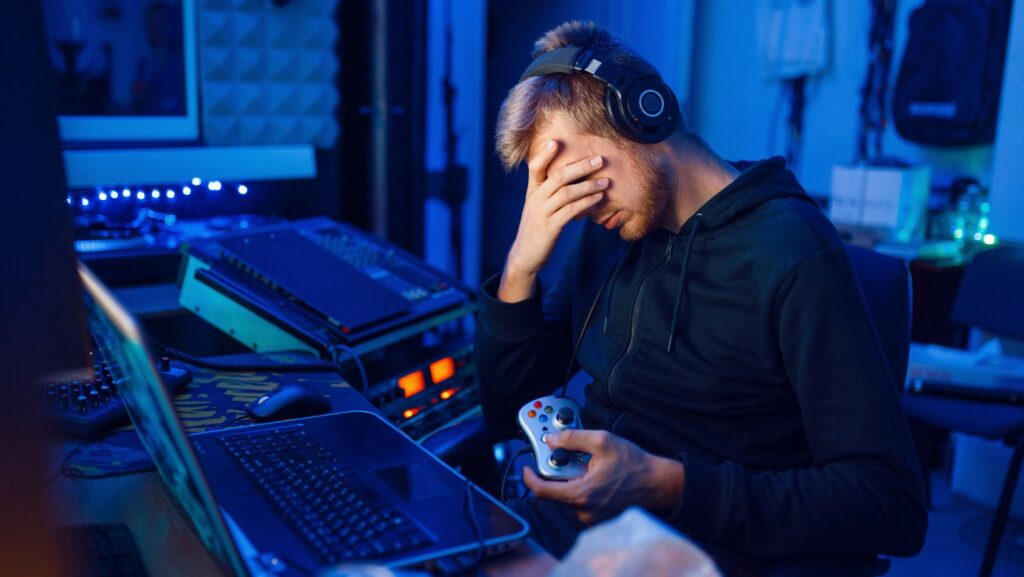In the immersive world of gaming, it’s easy to lose track of time. But with extended periods of play come significant health concerns that can’t be ignored. From musculoskeletal issues to vision problems, the impact of gaming on health is a growing concern in today’s digital age.
Understanding these health risks is crucial for gamers, parents, and healthcare professionals alike. This article dives into the key health problems associated with gaming and offers practical tips for mitigating these risks. So, whether you’re a casual gamer or a professional eSport athlete, this piece is a must-read.
Gaming Health Problems
 Prolonged sitting, frequent among avid gamers, contributes significantly to physical health problems. Research reveals a direct connection between excessive seated play and increased risk of obesity, heart disease, and diabetes. For example, teens engrossed in their favorite video games for hours may consume high-calorie snacks, leading to weight gain. Additionally, the posture adopted during gaming often includes bending forward, straining the musculoskeletal system, and causing disorders such as kyphosis or hunchback.
Prolonged sitting, frequent among avid gamers, contributes significantly to physical health problems. Research reveals a direct connection between excessive seated play and increased risk of obesity, heart disease, and diabetes. For example, teens engrossed in their favorite video games for hours may consume high-calorie snacks, leading to weight gain. Additionally, the posture adopted during gaming often includes bending forward, straining the musculoskeletal system, and causing disorders such as kyphosis or hunchback.
Vision Problems Associated with Gaming
Gamers, engrossed in their screen battles, expose their vision to certain risks. Digital eye strain, commonly referred to as Computer Vision Syndrome (CVS), arises from prolonged screen exposure. Symptoms include dry eyes, blurred vision, headache, and neck or shoulder pain. Additionally, the intense focus placed on advancing in the game and the rapid flashing images can exacerbate these issues.
Gaming’s Effect on Sleeping Patterns
Sleep disturbances manifest as prominent consequences of lengthy gaming sessions. It’s important to note that exposure to screens late at night interferes with the body’s natural circadian rhythm. Fierce games demanding high concentration keep gamers alert, delaying sleep onset, and reducing sleep quality. One study reports that frequent gamers fall asleep later and wake up earlier, getting less than the recommended 7-9 hours of sleep.
The Psychological Consequences of Excessive Gaming
Beyond the physical implications, extensive gaming fosters psychological repercussions, needing as much attention and addressal. These harmful consequences entail addiction, social isolation, and potential mental instability due to violent content.
Gaming Addiction and Mental Health
 Increasing engagements in gaming can escalate into an alarming addiction, identified by The World Health Organization (WHO) as a contemporary disease. WHO classifies this obsessive habit as ‘gaming disorder’ which, calculated by Global Health Data Exchange, dramatically affected nearly 3 percent of the global population in 2019. Symptoms include an escalating sense of gaming time, restrictive control over gaming, and the inclination to prioritize it over other essential aspects of life. For instance, disregarding personal hygiene, academic or work responsibilities, and social commitments. It’s relevant to mention the Diagnostic and Statistical Manual of Mental Disorders (DSM-5) recognizes Internet Gaming Disorder as a potential diagnosis, reminiscent of substance-related addictive disorders.
Increasing engagements in gaming can escalate into an alarming addiction, identified by The World Health Organization (WHO) as a contemporary disease. WHO classifies this obsessive habit as ‘gaming disorder’ which, calculated by Global Health Data Exchange, dramatically affected nearly 3 percent of the global population in 2019. Symptoms include an escalating sense of gaming time, restrictive control over gaming, and the inclination to prioritize it over other essential aspects of life. For instance, disregarding personal hygiene, academic or work responsibilities, and social commitments. It’s relevant to mention the Diagnostic and Statistical Manual of Mental Disorders (DSM-5) recognizes Internet Gaming Disorder as a potential diagnosis, reminiscent of substance-related addictive disorders.
Social Isolation Due to Gaming
Excessive gaming often fosters social isolation, propelling gamers into a confined virtual world. Evidence sourced from a study published by the Journal of Youth Adolescence demonstrates a negative correlation between excessive gaming and the quality of real-world social relationships. Specifically, instances of muted interpersonal relationships, marginal engagement in social activities, or outright avoidance of face-to-face social interactions are prominent markers. The effect exacerbates, manifesting as loneliness and depression, as a 2019 study by the American Journal of Health Promotion emphasized.
Mitigating the Hazards of Excessive Gaming
 While gaming’s allure can be hard to resist, it’s crucial to remember the health risks that come with overindulgence. Physical ailments like musculoskeletal issues and vision troubles shouldn’t be overlooked. It’s equally vital to consider the psychological toll excessive gaming can impose. Gaming addiction is a recognized disorder that can lead to the neglect of personal responsibilities. Social isolation is another concern, as it can negatively affect real-world relationships. Moreover, exposure to violent content in games could desensitize players to violence and potentially amplify aggressive behaviors. Awareness is the first step towards mitigating these risks. Regular breaks, maintaining a balanced lifestyle, and mindful gaming can go a long way in preserving one’s health while enjoying the virtual world.
While gaming’s allure can be hard to resist, it’s crucial to remember the health risks that come with overindulgence. Physical ailments like musculoskeletal issues and vision troubles shouldn’t be overlooked. It’s equally vital to consider the psychological toll excessive gaming can impose. Gaming addiction is a recognized disorder that can lead to the neglect of personal responsibilities. Social isolation is another concern, as it can negatively affect real-world relationships. Moreover, exposure to violent content in games could desensitize players to violence and potentially amplify aggressive behaviors. Awareness is the first step towards mitigating these risks. Regular breaks, maintaining a balanced lifestyle, and mindful gaming can go a long way in preserving one’s health while enjoying the virtual world.

